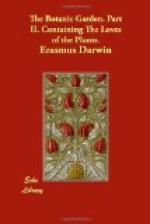Pellucid films her shivering neck o’erspread,
460 Seal her mute lips, and silver o’er her head,
Veil her pale bosom, glaze her lifted hands,
And shrined in ice the beauteous statue stands.
—DOVE’S azure nymphs on each revolving year
For fair TREMELLA shed the tender tear;
465 With rush-wove crowns in sad procession move,
And sound the sorrowing shell to hapless love.”
Here
paused the MUSE,—across the darken’d
pole
Sail
the dim clouds, the echoing thunders roll;
The
trembling Wood-nymphs, as the tempest lowers,
470 Lead the gay Goddess to their inmost bowers;
Hang
the mute lyre the laurel shade beneath,
And
round her temples bind the myrtle wreath.
—Now
the light swallow with her airy brood
Skims
the green meadow, and the dimpled flood;
475 Loud shrieks the lone thrush from his leafless
thorn,
Th’
alarmed beetle sounds his bugle horn;
Each
pendant spider winds with fingers fine
His
ravel’d clue, and climbs along the line;
Gay
Gnomes in glittering circles stand aloof
480 Beneath a spreading mushroom’s fretted
roof;
Swift
bees returning seek their waxen cells,
And
Sylphs cling quivering in the lily’s bells.
Through
the still air descend the genials showers,
And
pearly rain-drops deck the laughing flowers.
INTERLUDE.
Bookseller. Your verses, Mr. Botanist, consist of pure description, I hope there is sense in the notes.
Poet. I am only a flower-painter, or occasionally attempt a landskip; and leave the human figure with the subjects of history to abler artists.
B. It is well to know what subjects are within the limits of your pencil; many have failed of success from the want of this self-knowledge. But pray tell me, what is the essential difference between Poetry and Prose? is it solely the melody or measure of the language?
P. I think not solely; for some prose has its melody, and even measure. And good verses, well spoken in a language unknown to the hearer, are not easily to be distinguished from good prose. B. Is it the sublimity, beauty, or novelty of the sentiments?
P. Not so; for sublime sentiments are often better expressed in prose. Thus when Warwick in one of the plays of Shakespear, is left wounded on the field after the loss of the battle, and his friend says to him, “Oh, could you but fly!” what can be more sublime than his answer, “Why then, I would not fly.” No measure of verse, I imagine, could add dignity to this sentiment. And it would be easy to select examples of the beautiful or new from prose writers, which I suppose no measure of verse could improve.




